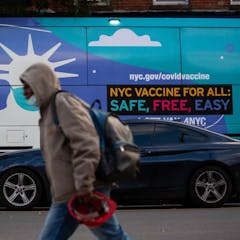
Articles on COVID-19 vaccines
Displaying 81 - 100 of 576 articles

Vaccine hesitancy may be a waiting game. Even those who said they would never get the COVID-19 vaccine if it were available immediately became more likely to do so when it was available in the future.

Myocarditis following COVID-19 vaccination is rare, and the risk is much smaller than the risks of cardiac injury linked to COVID-19 itself.

A legal scholar explains what the ruling means for other vaccine mandates and the government’s ability to protect public health.

Can the government mandate vaccines? Canadians have rights to make decisions about vaccination, but these rights are not absolute, and do not mean those decisions will have no consequences.

The new variant threatens to infect billions worldwide in early 2022.

Not all parents agree about vaccinating their child. Here’s what’s likely to happen if cases go to court.

Even with a variant like Omicron that may be more transmissible than earlier variants, vaccines remain the most effective tool for protection against COVID-19 and for ending the pandemic.

The public has been left to their own devices as all our previous safeguards collapse around us. We urgently need a “vaccines-plus” strategy to flatten the curve.

Instead of assuming that science skeptics are motivated by ignorance, or selfishness, we should listen to them and try to understand and address their actual concerns.

Skeptics may make demands for absolute certainty to undermine science and delay action. Critiques may not be in the interest of advancing science and public health, but by someone with an agenda.

Vaccines and medical treatments can only go so far in an unequal society. Facing the ongoing history of racial discrimination and bias in the US would help end the pandemic.

Some vaccine hesitancy is based on a fear of the nanoparticles used in mRNA vaccines. But humans have been interacting with nanoparticles for millennia, and we use nanotechnology-based devices every day.

A panel of experts answer questions about vaccines, omicron and other COVID-related issues in a discussion with The Conversation.

Queer dating apps are leading the way when it comes to being more open about sexual health and health in general.

Conversations and debates about vaccine mandates will continue well into next year as policy-makers balance individual freedom and public well-being.

In places with low vaccination rates, COVID-19 has the chance to linger, and variants develop and travel. Without global vaccine equity, this entirely predictable pattern will repeat itself.

One of the ways the Omicron variant is different from other variants is the sheer number of mutations in the spike protein. Does this make it a super-variant?

Fear of prosecution and a history of distrust toward the government have contributed to some fundamentalist groups’ views of medicine.

Knowing when and how often to use rapid tests is key to getting an accurate picture of your COVID-19 status.

The participation of five-to-11-year-old children in vaccination programs will make 90 per cent of the population eligible to get vaccinated against COVID-19.
